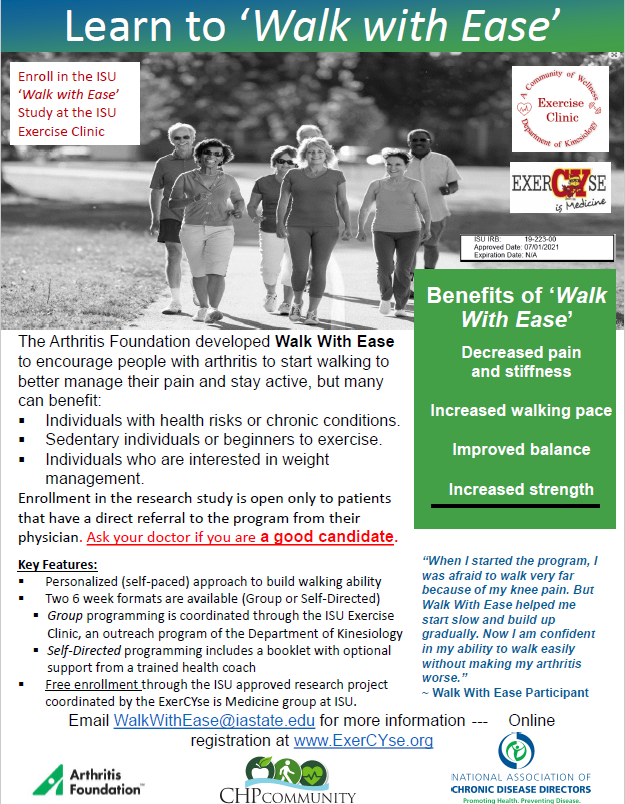Walk With Ease at ISU
Many students involved in Exercise is Medicine are also involved in Walk with Ease (WWE) at ISU. WWE is a structured walking program designed for adults aged 60 and older, including in-person sessions as well as virtual. The in-person sessions are located in Ames, IA as well as Story City, IA. Walk with Ease was developed by the Arthritis Foundation and our team is working with CHPcommunity to support dissemination across the state. The local programming provided at ISU is set up as a research study to allow versions of the programming to be evaluated. Detailed information is provided in the Informed Consent document but summary Information is provided below.
For additional information or to ask questions, please feel free to contact us at walkwithease@iastate.
Program Overview
Walk with Ease is a 6-week program designed to help individuals establish regular patterns of walking. The program is endorsed by the Centers for Disease Control as an evidence-based program for older adults. Participants in the study can choose from two formats but both are based on the same foundation and principles.
Group Option: The group program option consists of 3 self-paced, one-hour-long walking sessions each week for 6 weeks, with a goal of increasing walking ability each week. Sessions are held at predetermined times and locations to help create a consistent walking routine and to allow interactions with peers and program leaders.
Self-Directed Option: The self-directed program option provides the same included in the group sessions, but with the freedom to complete the walking sessions independently. Participants receive a guidebook with education content and are also given the opportunity to be guided by a trained student health coach to provide motivation and support.
Requirements
The program is open to anyone over the age of 60 who could benefit from becoming more physically active. To be eligible, you must be able to stand without increasing pain for at least 10 minutes, must be referred to the study by their health care provider, and must be willing to complete several surveys and fitness assessments as part of the research project.
Enrollment Information
If you feel that you are eligible to participate, and would benefit from participation in this study, speak to your health care provider for a referral to the research team, who will provide informed consent documentation and answer any questions you may have.
Please visit our website for more details!
Tips for Interacting With the Elderly
Many elderly people have hearing and vision loss. Face residents when speaking to them and remember to speak clearly and slowly. If a resident has significant hearing loss, do not give up on conversation. Sometimes residents can hear better in one ear than the other. Try speaking into the ear they gesture to, or the ear they turn your way. Give the resident time to respond to you; sometimes it takes them longer to process your words. Some residents may not be interested in having a conversation, but an initial attempt should always be made. The elderly enjoy getting to know new people and have amazing stories to tell. Not all of them have frequent visitors, so having a conversation with them can make their day. Another important thing to remember: never treat the residents like children. Although the residents may have some impairments, they are still adults. Nicknames such as, honey, sweetie, and darling are inappropriate. Residents should always be referred to by their given name.
